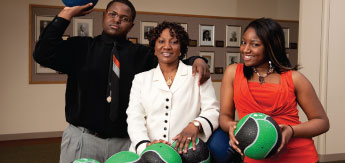 Amy McCarthy
Amy McCarthy
South Boston Collaborative Advisory Network (SBCAN)
SBCAN is one of our Champions for Strategic Issue #3 around trauma and resiliency. How does this issue connect to the South Boston neighborhood?
South Boston has high rates of overdoses and suicides, which can be traumatic for the families directly impacted, but also neighbors and other community members. There is also a deep history around busing and racism that people are still working through today. Trauma impacts every aspect of our lives and we tend to neglect the day-to-day aspect of it –there’s a domino effect there. It can be influenced by socioeconomic factors too. For example, if I have a client that has a history of abuse, even going to look for a job can be difficult because he or she is unable to build trust and relationships. If you’re not emotionally well or physically well in one area of your life, it can strongly affect other areas as well.
Something important to state is that the coalition is working to build a trauma response network. The goal is to streamline the community’s response to a tragic event. More first responders would be trained to assist families in crisis, whether coordinating meals or identifying support for a therapeutic intervention.
What other issues are important for the community?
Gentrification is a big issue. There’s been a lot of gentrification in the last 7-10 years. New people come into the neighborhood with the aim of making it more welcoming and they feel that they add value to the community, but it comes at a cost. People that have been in the neighborhood for a long time feel like they are being pushed out. It’s also another way of looking at trauma and what it must be like for someone to be pushed from their home. There’s a lot of work to be done on bridging the gap between residents (new and old) in order to live harmoniously and collaboratively as neighbors.
How does your work at The Home for Little Wanderers and South Boston families connect to SBCAN?
We are one of 32 community service agencies in the State funded by Mass Health to help children and families with mental health conditions. We use a wraparound approach, which means we bring friends, family members, neighbors and professionals together and creatively think about how to keep an individual safe. Part of that work is done with individual families and the other part is working to build connections within the community. The mission of SBCAN is related to our work and allows us to look at the connection between the mental health of our families and the well-being of the community. It’s important to be part of SBCAN’s effort to build a healthier community so that the families we serve have better outlets and supports.
If someone were thinking of moving to South Boston, what would you say to encourage them to move?
People in South Boston take care of one another and work to build a neighborhood atmosphere. It’s like a village inside a city. It’s a diverse neighborhood in many ways–racially, economically, religiously—and even with its history, there are people working together. Plus, it’s great to have access to the beach and get the best of urban and suburban life.
Amy McCarthy is a Senior Intensive Care Coordinator at The Home for Little Wanders Dorchester-South Boston Community Service Agency. Originally from Western Massachusetts, she moved to Boston to pursue a Master’s Degree in Social Work from Wheelock College. Amy has lived in Dorchester for five years and one of her favorite things to do in the summer is to go to Castle Island and eat at Sullivan’s in South Boston.

